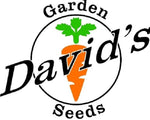Turnip Seven Top 200 Non-GMO, Heirloom Seeds
The Turnip Seven Top stands apart as a leafy green specialist, cultivated primarily for its abundant, nutrient-dense foliage rather than root development. This heirloom variety delivers tender, flavorful leaves ideal for fresh salads, sautés, steaming, or traditional Southern preparations. With a robust germination rate of 80% or higher and a harvest window of 45 to 65 days, Seven Top offers reliable productivity and extended picking potential throughout the season. As a Non-GMO heirloom, this variety maintains the genetic integrity and flavor profile that discerning gardeners seek. The seeds arrive in eco-conscious, reusable packaging that aligns with sustainable cultivation practices. David's Garden Seeds has been family-owned and veteran-operated since 2009, bringing decades of horticultural expertise and commitment to seed quality to every packet. Whether you're seeking a prolific cool-season green, planning succession plantings for continuous harvest, or adding nutritional diversity to your vegetable garden, Turnip Seven Top delivers the vigor, versatility, and dependability that define a premium heirloom offering.
Order today and grow fresh turnips in your spring & fall gardens.
David’s Garden Seeds is a Veteran owned business that has been offering quality seeds since 2009.
David's Garden Seeds® is a member of the GO TEXAN agriculture program.
We cannot possibly put all the directions you need for Turnip Seven Top in your area on the seed package. We recommend that you read articles or check with other gardeners in your area.
This is an heirloom seed, meaning it has been passed down from generation to generation for at least 75 years. As a rule, heirloom seeds taste better and will grow the same year after year.
These are also open pollinated meaning they will reproduce themselves. While all heirlooms are open pollinated not all open pollinated seeds are heirlooms.
Freshly Packed: These seeds are packed for the current growing season and will provide high germination rates next year as well.


